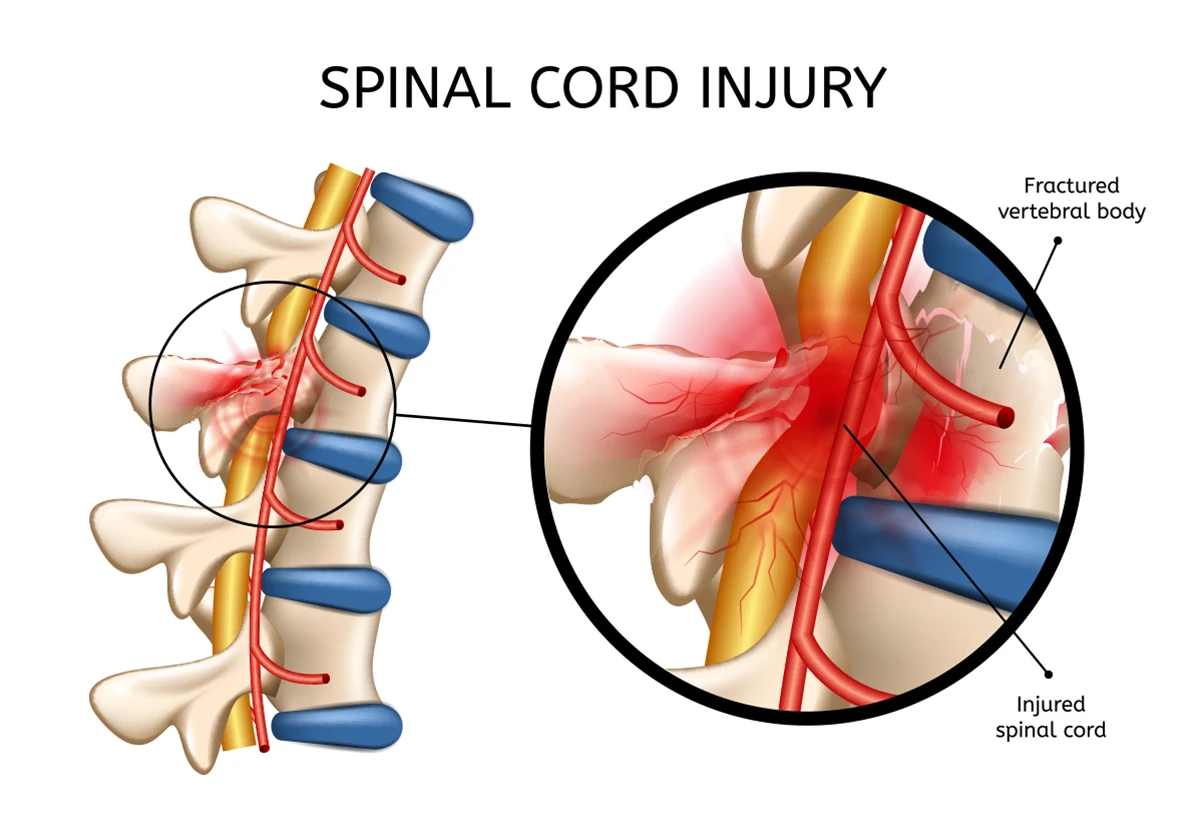Acute spinal cord injury
Request an appointmentA spinal cord injury could happen at any time. Maybe you’re in a car accident that hurts your back, or maybe you’re injured while playing a sport or exercising. Damage may also be caused by other health conditions, such as osteoporosis, cancer, multiple sclerosis or arthritis.
If this happens to you, trust Aurora Health Care’s expert care for acute spinal cord injury. We provide the most up-to-date testing for an acute spinal cord injury and the latest treatment methods to help you get back to your daily routine.
What is an acute spinal cord injury?

The image shows an injury to the spinal cord and a fractured vertebra on part of the spine.
An acute spinal cord injury (SCI) is a serious and potentially life-changing injury that occurs when the spinal cord is damaged or compressed.
The spinal cord is a bundle of nerves that runs from the brain down the back, carrying messages between the brain and the rest of the body. When the spinal cord is injured, these messages can be interrupted, leading to a loss of function below the level of the injury.
Types of acute spinal cord injuries
The severity of an SCI depends on the extent of the damage to the spinal cord. There are two types of an acute spinal cord injury:
- Complete: A complete acute spinal cord injury is one that severs the spinal cord completely, resulting in a loss of all sensation and movement below the level of the injury.
- Incomplete: An incomplete SCI is an injury that does not completely sever the spinal cord, so some sensation and movement may be preserved.
Spinal cord injury symptoms
A spinal cord injury is always a serious medical concern. It can affect your daily life and ability to perform the most basic functions, such as getting dressed, walking or doing your job.
Spinal cord injury symptoms can be severe, moderate or mild depending on the severity of your spinal cord injury and where it’s located on your spinal cord. Common symptoms include:
- Loss of sensation: This may include numbness, tingling or burning pain below the level of the injury.
- Loss of movement: This may include paralysis, weakness or muscle spasms or stiffness.
- Loss of bladder and bowel control: This can lead to incontinence or difficulty emptying the bladder or bowels.
- Sexual dysfunction: This can include problems with erectile dysfunction, achieving an orgasm or fertility.
- Pain: This can be caused by the injury itself or by other complications, such as nerve damage.
There are instances where a spinal cord injury can be life-threatening. If you’re experiencing any of the symptoms below, call 911 or go to your nearest emergency department.
- Difficulty breathing
- Difficulty balancing or walking
- Lack of alertness (semi-consciousness or unconsciousness)
- Oddly positioned or twisted neck or back
- Shock (pale skin, bluish lips and fingernails)
Is your back and neck pain cause for concern?
Back and neck pain can interrupt even the simplest things in life and can point to a serious problem. Our back and neck pain quiz evaluates your spine function, pain symptoms and risk factors and gives you an idea of what to do next based on your results.
Diagnosis of spinal cord injuries
Diagnosing a spinal cord injury involves a combination of a physical exam and imaging tests to pinpoint the location and extent of the injury.
During your physical exam, your provider will review your medical history and ask about how the injury happened, any pre-existing conditions and if you’ve had any past injuries.
To diagnose your injury, your doctor will use a standardized neurological exam, which includes testing your motor and sensory skills, as well as an anal muscle test to determine whether the injury has affected the base of your spine.
Your provider may also order digital imaging tests, such as:
- MRI or CT scan: These tests allow your doctor to assess nerve and spinal column damage, blood clots or masses.
- X-rays: This test can reveal vertebral (spinal) fractures, tumors or degeneration.
Accurate and timely diagnosis is crucial for getting the proper treatment and optimizing recovery. Schedule an appointment with your doctor right away if you suspect a spinal cord injury.
Treatment for spinal cord injuries
There's no cure for spinal cord injuries, but Aurora’s spinal care team uses the latest treatments aimed at stabilizing the spine, managing symptoms and maximizing functional recovery.
Your treatment plan depends on the severity of your injury and may include:
- Immobilization: Traction, braces, harnesses and collars can stabilize your spine and stop you from moving.
- Medication: Corticosteroid drugs may help reduce swelling.
- Rehabilitation: Physical therapy and occupational therapy work to strengthen your muscles and help you relearn skills or techniques so you can become more independent. Therapy may begin while you’re in the hospital. It can continue as you transition to a rehabilitation center or an outpatient facility.
- Surgery: In some cases, your doctor may need to remove fragments of bone or disc herniations.
Find spine care near you
When you have a spinal cord injury, the Aurora Spine Program makes it easier for you to get back to the things that matter most.
With a single-entry point and your own care coordinator, you’ll be connected to an integrated team of specialists all working together on your personalized treatment plan.
Get care
We help you live well. And we’re here for you in person and online.